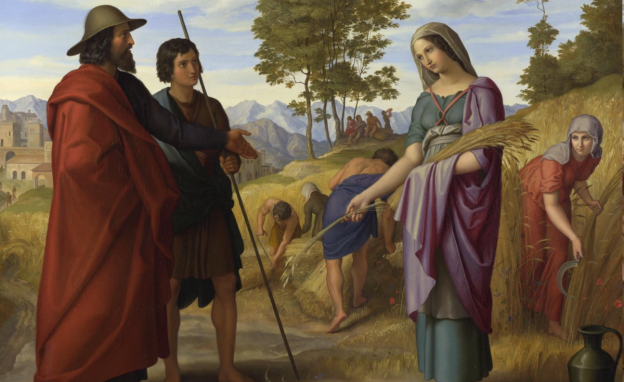Sometimes a simple decision sets off a chain of events in our lives which can lead to disaster. This is especially the case with a sinful decision that sets us on a path of sustained disobedience to God.
The book of Ruth begins with just such a decision, and just such a disaster. While the lesson of the first few verses is a reminder to take care with the decisions we make and whether they honour our Creator God and Christ our Saviour, they also remind us that sometimes the depths of disaster are where God’s mercy is most strongly felt.
The book of Ruth, which begins with the story of Naomi, took place in the time of the Judges (v.1). As we read in the Book of Judges, this was a time of spiritual and moral decline for God’s People in the land, as they spiralled towards the depravity and debauchery that was the same as the nations around, came under God’s curse. God raised up Judges to lead God’s People in throwing off their oppressors and turning back to him, but as time went on the judges became just as troublesome as the people they led.
In Judges, the curse came through the form of foreign nations which oppressed and ruled over Israel. But this was not the only means of discipline that God applied to Israel. In Deuteronomy 28, we read that a series of punishments would come upon Israel for disobeying God. One of these is famine, which came upon the land at the beginning of the story (v.1).
Elimelech, the husband of Naomi, lived in Bethlehem when this famine arrived. Ironically, Bethlehem means “house of bread”, except its name was not being lived up to. Faced with famine, Elimelech uprooted with his wife Naomi and their two sons to the land of Moab (vv.1-2).
While we might relocate to another city or country in our day without much care or concern, this was a very dramatic thing for a covenant member to do. In effect, Elimelech was placing himself in the domain of the so-called gods of Moab, and suggesting that they were able to provide something which God could not provide: food for his family.
Moving to Moab, the people descended from Lot’s incestuous relationship with his daughter (Gen. 19) and who had attempted to defeat Israel through seducing them into sin (Numbers 22), was a questionable decision at best. While Elimelech’s name might have confessed that his God was King, Elimelech lived his life in a manner which suggested otherwise.
Whether Naomi agreed with this action or not is not stated, but given she remained there after her husband died (v.3) we can conclude that she either approved of the action or she at least grew comfortable with the move. Certainly, she and her sons did not move back to live with God’s covenant people, as they ought to have. They did not interpret Elimelech’s death as a sign that God was displeased with their move; after all, death comes to all of us.
Though Elimelech had died, Naomi still had her two sons to support her (v.3). In those days there was no Government support for spouses that lost their husband; they relied entirely on family for support. In Moab, away from her extended family, clan, and tribe, Naomi would rely entirely on her sons and any children they had for financial support.
Naomi’s two sons married Moabite women, named Orpah and Ruth (v.4). Things seemed alright, as they continued to live in Moab for ten years (v.4). Though neither son along with his Moabite wife was blessed with children. They did not interpret this barrenness as a sign that God was displeased with their move and continued sojourn in a foreign land.
But worse was to come. After ten years, both Naomi’s sons died, “so that the woman was left without her two sons and her husband” (v.5). Now who would care for Naomi in a foreign land, with nobody to provide for her?
A simple decision to move from Bethlehem to Moab, if a more momentous and serious one than for us, but a decision which was disobedient to God and led through events and decisions to further disaster. A decision that was based in denying God’s goodness to provide (food), and trusting in themselves.
While we have more freedom about where we live in the days of the Church being everywhere, this passage does remind us to be careful with the decisions that we make in our lives. Sometimes, a simple sinful decision sets off an avalanche of pain and disaster in our lives, as a pattern of disobedience sets in. Sometimes, we forget or deny God’s goodness to us, and seek to provide our own desires in our own strength.
While some who walk away do not return, this passage is the opening to a book where God’s mercy shines through. Thus it also reminds us that sometimes salvation and mercy come from the deepest depths of disaster and despair.


